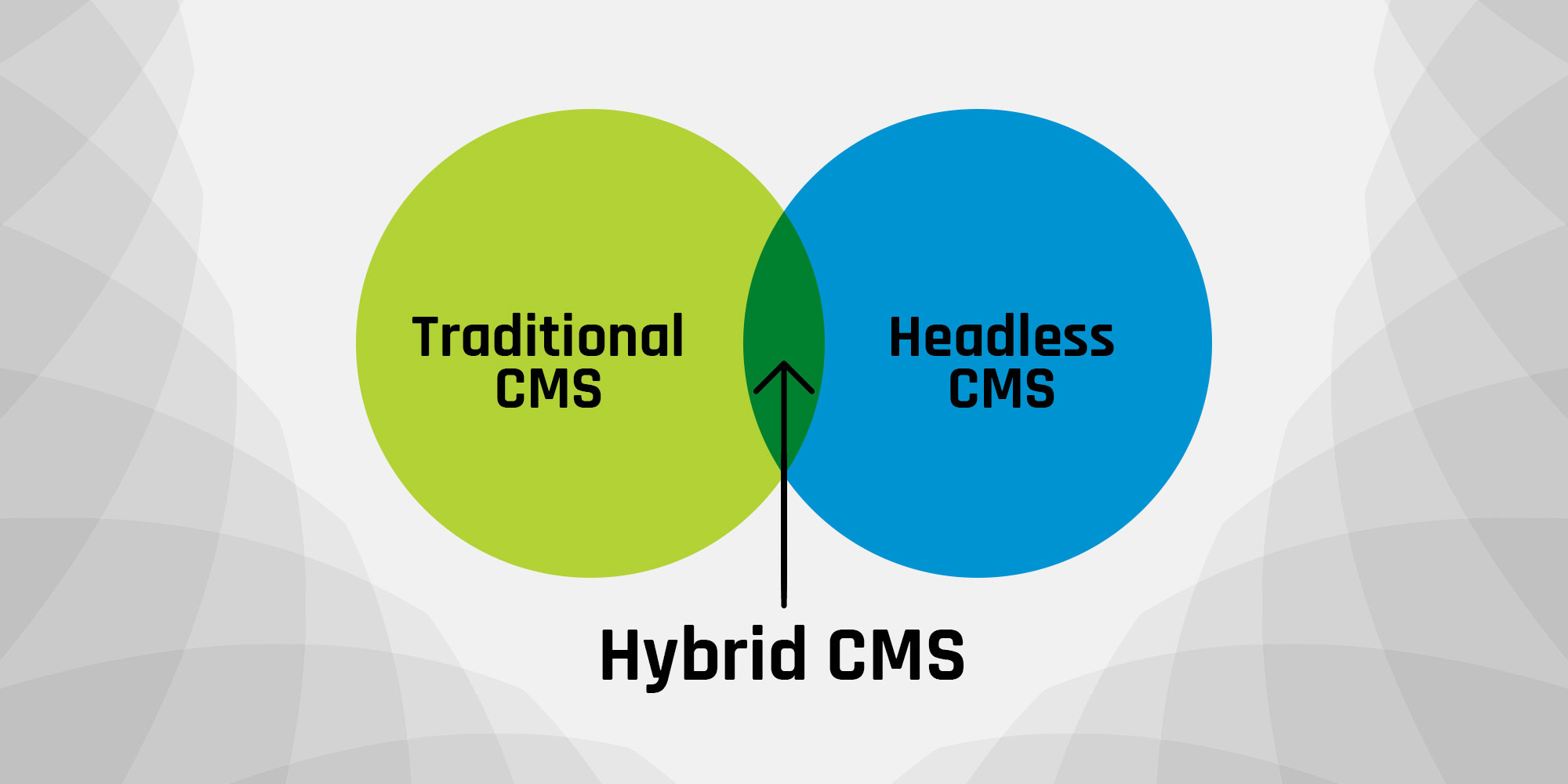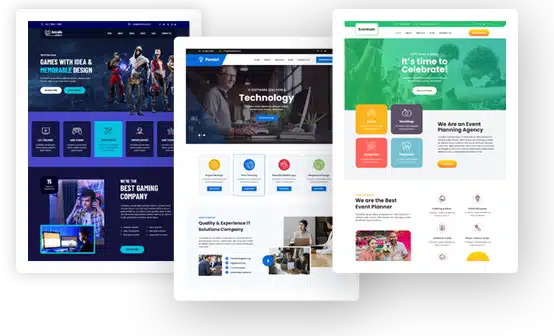What is a Hybrid Content Management System (CMS)? How will it forever change your website?

In the current fast-paced digital world, content is king. It is the driving source for businesses of all sizes to create compelling content that drives engagement, increases conversions, and boosts their bottom line. But with so many channels to manage—from websites and social media to email campaigns and mobile apps—managing content can quickly become overwhelming.
As businesses strive to create compelling content experiences across multiple channels and devices, a new player has emerged: the hybrid CMS. It is a powerful tool that combines the best of both worlds—the flexibility and ease-of-use of a headless CMS with the control and customization of a traditional CMS.
In this article, we’ll take a closer look at what a hybrid CMS is and why it’s becoming a game-changer for content management in the digital age.
So, buckle up and get ready to discover the future of content management!
What is a hybrid content management system (CMS)?
A hybrid CMS (content management system) is a system that combines elements of both traditional CMS and headless CMS. Typically, a hybrid CMS covers most of the pros we see in Headless CMS vs. Traditional CMS, so, hybrid CMS is gaining popularity recently.
Let’s dig deeper to understand it from scratch.
Traditional CMS: A traditional CMS operates with a front-end presentation layer that is tightly integrated with the back-end content management system. It provides a unified interface for managing both content and presentation.
Headless CMS: In contrast, a headless CMS separates the front-end presentation layer from the back-end content management system. It provides an API for accessing the content, allowing developers to build custom presentations for any device.
Hybrid CMS = Traditional CMS + Headless CMS
A hybrid CMS combines these two approaches, providing a traditional front-end presentation layer while also exposing an API for accessing content in a headless manner.
Here’s how it has become a gamechanger in the digital world.
- This allows developers to take advantage of the ease-of-use and accessibility of a traditional CMS while having the flexibility to build custom front ends for specific use cases.
- This approach allows for a more streamlined content management experience.
- It offers greater flexibility in delivering content across multiple devices and platforms.
- Hybrid CMS platforms also typically offer a wide range of features, including version control, user management, and workflow management, making them well-suited for larger organizations with complex content management needs.
Now that you have an idea on the concept of hybrid CMS, read on to learn why hybrid CMS would be the best choice for you.
Why is a hybrid CMS a good bet for your website?
Hybrid CMS continues to cater to the growing demand for flexible and scalable content management solutions. This, coupled with the increasing importance of delivering a good user experience across multiple devices and platforms, makes hybrid CMS a solution that is well-positioned to revolutionize websites forever.
Here are some more reasons to stick with it:
-
Flexibility
A hybrid CMS provides the best of both worlds, allowing for a traditional front-end presentation layer while also exposing an API for accessing content in a headless manner. Here’s something more to it. Read on.
- It will help you gain more flexibility in delivering content across multiple devices and platforms.
- Hybrid CMS allows content editors to create and edit content using a combination of traditional CMS tools and modern front-end development tools.
- This flexibility enables editors to create and manage content in a way that suits their skill set and workflow.
-
Ease-of-use
With hybrid CMS, you get to leverage the ease-of-use of a traditional CMS with the flexibility of a headless CMS. It is designed to provide a user-friendly and intuitive interface for both content editors and developers.
It provides a visual editing interface that allows them to create and edit content using a drag-and-drop or WYSIWYG (What You See Is What You Get) editor. This resolves a great challenge for the content creators in the process.
Additionally, it provides tools and resources that make it easy to integrate with other systems and platforms, such as APIs, webhooks, and SDKs. This makes it easier for developers to create custom integrations and workflows that meet their specific needs.
-
Improved Scalability
Hybrid CMS systems allow you to handle a large amount of content and can be scaled up as needed. It makes them well-suited for larger organizations with complex content management needs. This allows websites to grow and evolve over time without being limited by the capabilities of the CMS.
-
Better Integration
A hybrid CMS can be integrated with other systems and tools, such as marketing automation, analytics, and e-commerce platforms. This can help to streamline processes, reduce manual work, and deliver a more seamless experience for users.
-
Improved Performance
A hybrid CMS can deliver improved performance compared to a traditional CMS, as the front-end and back-end can be optimized for specific use cases and devices. This can help to reduce page load times, improve page speed, and deliver a better overall user experience.
Plus, many hybrid CMS platforms often include analytics and optimization tools that allow for the tracking of content performance and the optimization of content delivery. This can help streamline the content delivery process by providing insights into what content is working and what is not, allowing for adjustments to be made accordingly.
-
Cost-effective solution
Hybrid CMS proves to be more cost-effective as compared to traditional or headless CMS. You get the best of both worlds with it. While traditional CMS development like Drupal web development may get costlier comparatively; thinking about Hybrid CMS for your next project could be a rewarding idea!
-
Content delivery
In a traditional CMS, the front-end and back-end are integrated, making it easier to deliver content directly to the front-end, while a headless CMS requires a separate front-end to be built to deliver content. A hybrid CMS provides a mix of both approaches, allowing for direct delivery of content and the flexibility to build a custom front-end.
- Content editors can create and manage content from a single platform of hybrid CMS, ensuring consistency and reducing the risk of errors.
- It reduces the need for manual content creation and distribution with its automation and personalization features.
- It allows for the creation of custom workflows for content creation, review, and approval, ensuring that content is delivered on time and meets quality standards.
Accelerate your pace in the growing market with a hybrid CMS
A hybrid CMS is a flexible, scalable, and user-friendly solution for organizations with complex content management needs. It provides the ease-of-use of a traditional CMS and the flexibility of a headless CMS, making it a versatile option for organizations looking to deliver a better user experience across multiple devices and platforms.
Organizations looking to improve their content management processes and deliver a better user experience to their customers should consider adopting a hybrid CMS. By combining the strengths of both traditional and headless CMS, a hybrid CMS can help organizations streamline their processes, reduce manual work, and take advantage of new opportunities as they emerge.

